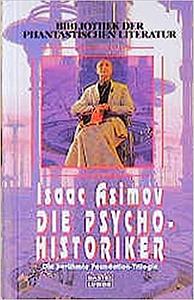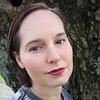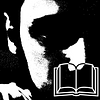Take a photo of a barcode or cover
Petition to start referring to recessions as Seldon Crises.
I) Scritta tra gli anni ’40 e ’50, la Trilogia della Fondazione (o Trilogia galattica) di Asimov racconta i miti della caduta e rinascita di un impero interstellare. La fantascienza sociopolitica di Cronache della galassia narra la saga della nascita della Fondazione, destinata a salvare l’umanità dai trentamila anni di barbarie che la colpiranno quando l’Impero inevitabilmente si disgregherà.
Questo primo capitolo è costruito per giustapposizione di singoli racconti ambientati in epoche diverse, nei quali non sono tanto importanti i protagonisti – spesso sbiaditi o altrimenti caricaturali – quanto i motivi che pervadono l’intera trilogia: la psicostoria di Hari Seldon, ovvero il controllo statistico sui movimenti di grande masse, facilmente calcolabili, e gli equilibri economici e politici tra nazioni.
Stilisticamente è un prodotto di consumo, appassionante ma caratterizzato da una scrittura un po’ debole, basata quasi esclusivamente sul dialogo.
Asimov si ispirò alla storia romana per il suo impero decadente.
II) Il crollo della galassia centrale, secondo capitolo della trilogia, è composto da un breve racconto iniziale che non c’entra molto con quanto segue. Il centro narrativo è la storia del Mulo, vero e proprio romanzo a sé stante. Episodio più avventuroso, richiama la mitologia norrena e la figura archetipica del suo dio Loki, re degli inganni. In questo caso però il segreto è nascosto da Asimov in modo puerile, e il lettore potrà intuire dove si va a parare dopo poche pagine.
III) L’altra faccia della spirale chiude la trilogia originale, espansa poi negli decenni successivi a vero e proprio ciclo composto da 7 titoli. Il tema principale di questo finale provvisorio è il mistero della seconda Fondazione, nascosta da qualche parte nell’universo conosciuto.
Questo primo capitolo è costruito per giustapposizione di singoli racconti ambientati in epoche diverse, nei quali non sono tanto importanti i protagonisti – spesso sbiaditi o altrimenti caricaturali – quanto i motivi che pervadono l’intera trilogia: la psicostoria di Hari Seldon, ovvero il controllo statistico sui movimenti di grande masse, facilmente calcolabili, e gli equilibri economici e politici tra nazioni.
Stilisticamente è un prodotto di consumo, appassionante ma caratterizzato da una scrittura un po’ debole, basata quasi esclusivamente sul dialogo.
Asimov si ispirò alla storia romana per il suo impero decadente.
II) Il crollo della galassia centrale, secondo capitolo della trilogia, è composto da un breve racconto iniziale che non c’entra molto con quanto segue. Il centro narrativo è la storia del Mulo, vero e proprio romanzo a sé stante. Episodio più avventuroso, richiama la mitologia norrena e la figura archetipica del suo dio Loki, re degli inganni. In questo caso però il segreto è nascosto da Asimov in modo puerile, e il lettore potrà intuire dove si va a parare dopo poche pagine.
III) L’altra faccia della spirale chiude la trilogia originale, espansa poi negli decenni successivi a vero e proprio ciclo composto da 7 titoli. Il tema principale di questo finale provvisorio è il mistero della seconda Fondazione, nascosta da qualche parte nell’universo conosciuto.
While I found the 2bd book to be a bit too expected, the 3rd book redeemed this trilogy for me.
I know the trilogy goes on for 2 more books. I have them and will eventually read them, but probably not until late this year or early next year.
Last year I read the first book. This year my plan was to read the 2nd book. I couldn't get a copy of just that book. My library had this one, which ended up working out better I think. I got to re-read the first, read the 2nd, and "finish" up with the 3rd. I could stop where I am, except I own books 4 and 5 and they exist so I'm going to read them.
Now for the review. I struggled a bit with the 1st book because it took me a while to get the feel of the world. I think re-reading it was definitely helpful. After the 2nd book, it felt unfinished so I was very happy to continue on. It was the 3rd part/book that made me decide on 4 stars. It made sense to me. I could see it ending there even though we know "the plan" still had hundreds of years to go.
By the last stage, it was much easier for me to follow the way things were in the universe of these books. Less effort was needed for me to fall into the world and live along with the people there. I'm not sure my individual reviews would have been 4 stars, but as a trilogy, I feel it does.
Last year I read the first book. This year my plan was to read the 2nd book. I couldn't get a copy of just that book. My library had this one, which ended up working out better I think. I got to re-read the first, read the 2nd, and "finish" up with the 3rd. I could stop where I am, except I own books 4 and 5 and they exist so I'm going to read them.
Now for the review. I struggled a bit with the 1st book because it took me a while to get the feel of the world. I think re-reading it was definitely helpful. After the 2nd book, it felt unfinished so I was very happy to continue on. It was the 3rd part/book that made me decide on 4 stars. It made sense to me. I could see it ending there even though we know "the plan" still had hundreds of years to go.
By the last stage, it was much easier for me to follow the way things were in the universe of these books. Less effort was needed for me to fall into the world and live along with the people there. I'm not sure my individual reviews would have been 4 stars, but as a trilogy, I feel it does.
Interesting stories but not particularly compelling writing or characterization.
An audiobook of BBC's radio adaptation. The adaptation shows it's age in the production style, still I quite loved the old fashioned intonation and over the top performance in some cases. Also a sign of age, hundreds and hundreds of years pass and only a handful of women make an appearance, even fewer a contribution to the story.
A classic of science fiction. While Heinlein's books tend to be about ideas and Clarke's are about scientific advances, Asimov's books best balance the various aspects of sci-fi and great storytelling -- including memorable characters and strong plots.
Of the books I've read, I still think The Robots of Dawn his best book (also his best title!) -- an honor it shares with Nightfall -- but it's been many years since I've read either. As for the Foundation Trilogy, I found the first one the best (called Foundation). It deals with the early years of the Foundation and the crises it must overcome on its way to becoming the Second Empire. The book plays to Asimov's strengths: interesting characters and ingenious solutions to problems (Asimov would have been an excellent mystery writer, as the Robots of Dawn proves). The second book (Foundation and Empire) deals with two crises: an attack by the Empire's last great general, and a mysterious person called The Mule, who seems able to conquer worlds without a fight. It is the second crisis that is the more interesting, since the man who planned the Foundation's transition into a Second Empire only factored in sociological forces, not individual aberrations. The final book, Second Foundation, deals with two separate searches for the Second Foundation, which has remained hidden since Hari Seldon created both Foundations in the waning days of the Galactic Empire.
It is what Asimov is saying, rather than how he is saying it, that makes these books special -- particularly what information he gives the reader, and when. His style is simple, but not simplistic, and doesn't delve in many cliches. Dialogue easily identifies each character speaking, and the main characters are easy to differentiate from each other. Plus, in an age when despicable characters grace too many novels, the characters in these books are flawed but heroic, or villainous but flawed, and always interesting.
The series won a Hugo Award for "Best All-Time Science Fiction Series," and while there's room for another series to take that crown away from Asimov, none have.
Of the books I've read, I still think The Robots of Dawn his best book (also his best title!) -- an honor it shares with Nightfall -- but it's been many years since I've read either. As for the Foundation Trilogy, I found the first one the best (called Foundation). It deals with the early years of the Foundation and the crises it must overcome on its way to becoming the Second Empire. The book plays to Asimov's strengths: interesting characters and ingenious solutions to problems (Asimov would have been an excellent mystery writer, as the Robots of Dawn proves). The second book (Foundation and Empire) deals with two crises: an attack by the Empire's last great general, and a mysterious person called The Mule, who seems able to conquer worlds without a fight. It is the second crisis that is the more interesting, since the man who planned the Foundation's transition into a Second Empire only factored in sociological forces, not individual aberrations. The final book, Second Foundation, deals with two separate searches for the Second Foundation, which has remained hidden since Hari Seldon created both Foundations in the waning days of the Galactic Empire.
It is what Asimov is saying, rather than how he is saying it, that makes these books special -- particularly what information he gives the reader, and when. His style is simple, but not simplistic, and doesn't delve in many cliches. Dialogue easily identifies each character speaking, and the main characters are easy to differentiate from each other. Plus, in an age when despicable characters grace too many novels, the characters in these books are flawed but heroic, or villainous but flawed, and always interesting.
The series won a Hugo Award for "Best All-Time Science Fiction Series," and while there's room for another series to take that crown away from Asimov, none have.
adventurous
fast-paced
Strong character development:
Yes
Loveable characters:
Yes
Diverse cast of characters:
Complicated
Flaws of characters a main focus:
N/A
Read for science fiction module.
This was my first Asimov, and I did enjoy it! The premise of the story is interesting and though not much happened, I liked the idea of the Foundation and the Encyclopedia Galactica. Looking forward to studying this one!
This was my first Asimov, and I did enjoy it! The premise of the story is interesting and though not much happened, I liked the idea of the Foundation and the Encyclopedia Galactica. Looking forward to studying this one!
mysterious
reflective
slow-paced
Strong character development:
No
Loveable characters:
No







